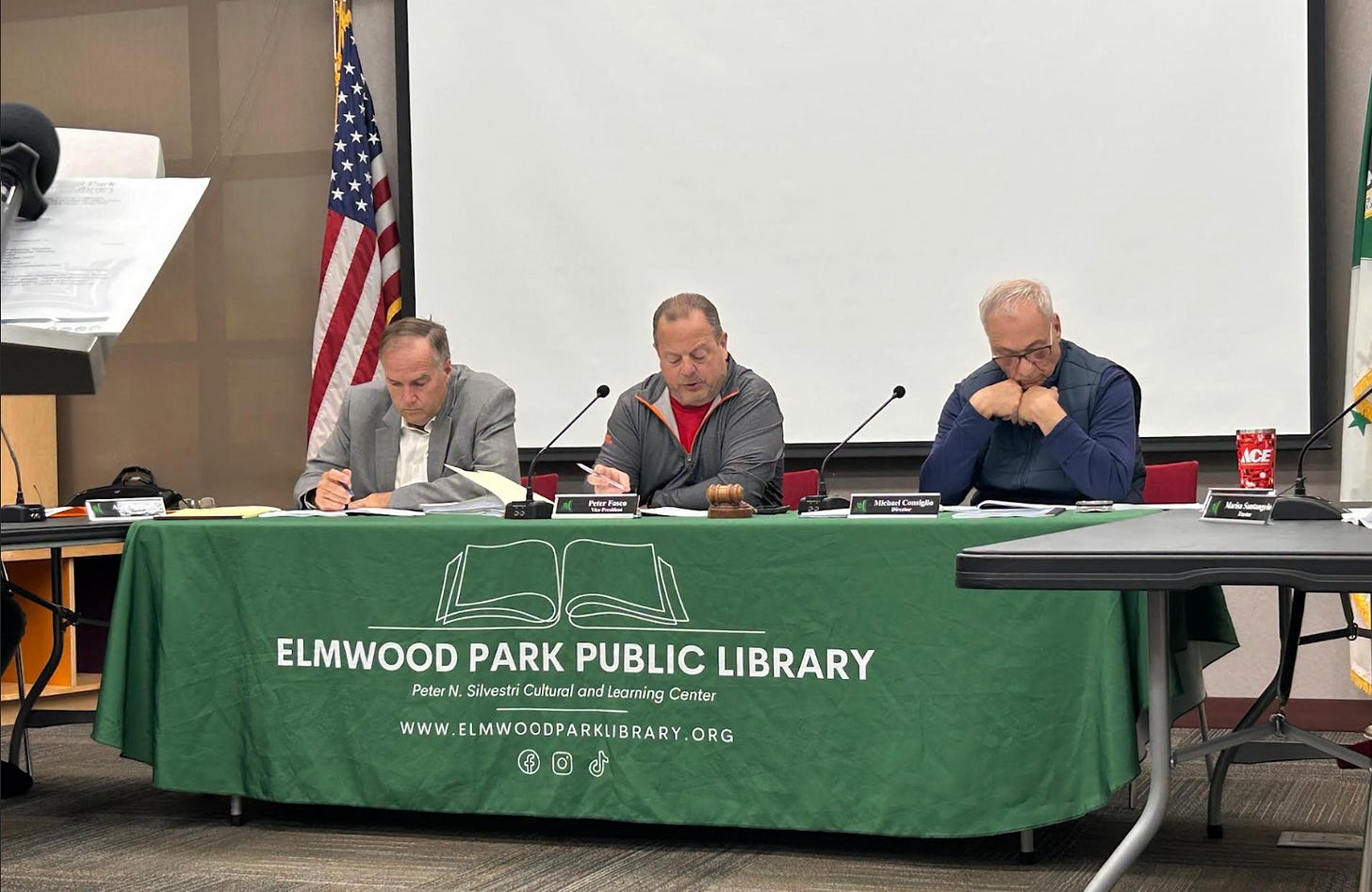Here's A Library Meeting Room Policy That Would End All This Nonsense

By Kevin Gosztola, Editor-In-Chief
Elmwood Park Public Library Director Michael Consiglio has spent the last three months trying to weaponize the library’s meeting room policy against the Elmwood Park Advocate
In response to the library director’s actions, which increasingly infringe upon the newsletter’s ability to engage with residents and gather local news, the Advocate proposes a new library meeting room policy.
The proposal was developed and written after reviewing the meeting room policies of 46 different public libraries in the north and northwest suburbs of Chicago. [See chart.]
Consiglio insists that the library is required to charge a $100 fee for community groups. That puts the Elmwood Park Public Library in the minority.
According to the suburban policies that the Elmwood Park Advocate surveyed, around three out of four libraries do not charge groups, organizations, or residents to use their meeting rooms. They uphold the First Amendment rights of all without putting a price on community access.
Many of the suburban libraries broadly understand “nonprofit” to cover civic, cultural, and educational groups as well as hobby clubs that have not obtained 501(c)3 status through the IRS. Plus, the average fee is under $50, much lower than the $100 fee that Consiglio would like to impose on community groups.
The Elmwood Park Advocate’s proposal would ensure free and open access for resident library card holders and community groups that find it too burdensome to incorporate and become an IRS-recognized 501c3 nonprofit organization.
As the proposal states, both library meeting rooms—the Ferrentino and the Korbel Rooms—would be available free of charge to “government representatives, 501c3 nonprofit organizations, nonprofit or not-for-profit community groups without a tax-exempt status, resident library card holders.”
It would lower the fee for for-profit organizations and non-residents to $75 for the first hour and $25 hour for each additional hour. Individuals seeking to use a meeting room for a commercial purpose would also be required to pay $75 for the first hour and $25 an hour for each additional hour.
Additionally, to ensure that the meeting rooms are only used by groups or organizations that need the space for larger gatherings, the proposal would set a minimum attendance requirement for each meeting room.
The Ferrentino Room has a maximum capacity of 60 people. The Korbel Room has a maximum capacity of 15 people. If 10 people do not show up for a reservation in the Ferrentino Room or three people do not show up for a reservation in the Korbel Room, then the library would be permitted to assess a $10 fee.
The proposal would continue the practice of prioritizing library-sponsored events. Library programming tends to be planned several weeks if not months in advance. However, when possible the policy states that the library may cancel a reservation for programming. “When this happens, the Library [would] make every attempt to communicate with the applicant who reserved the room in a timely manner so that their reservation [could] be rescheduled to another date and time.”
Back in September, this actually happened to the Elmwood Park Advocate. The newsletter had planned to hold its monthly “Community Conversation” on September 6. The library director asked the newsletter to change the date to September 20. The Advocate understood that the library needed the space, and the library director was thankful for our “understanding and flexibility.”
The application process for a reservation, along with kitchen use and potential cleanup fees, would remain unchanged. If any person making a reservation had to submit an appeal, the Library Board of Trustees would still have to review the appeal in a timely manner.
A public body like the library is not allowed to infringe upon or bar a group from broadly exercising their First Amendment rights just because a very small group of hecklers do not like the idea of that group exercising their rights. However, this is exactly what the newsletter believes the library director has done for the past months.
This dispute started with the library director siding with hecklers, who object to “the process and rationale behind hosting” the newsletter’s “Community Conversations” at the library. It has brought negative attention to the Elmwood Park Public Library.
During September, Consiglio proposed a meeting room policy with questionable provisions. He withdrew the proposal after it sparked outrage among several residents. We think that the newsletter’s proposal offers the library director and library board a path forward that may end this lengthy and unnecessary ordeal.
The Elmwood Park Advocate asks that subscribers, readers, or residents write to trustees on the library board. Attach a copy of the newsletter’s meeting room policy proposal.
Let trustees know that you are sick of the newsletter and the library director fighting each other, and that you believe this proposal could be a solution that protects the rights of residents and preserves meeting room access for everyone in Elmwood Park.
Contact:
Library Board President Chris Pesko - cpesko@elmwoodparklibrary.org
Library Board Vice-Presiden Peter Fosco - pfosco@elmwoodparklibrary.org
Library Board Secretary Jesus “Chuy” Segura - jsegura@elmwoodparklibrary.org
Library Board Treasurer Alice Balundis - abalundis@elmwoodparklibrary.org
Library Board Trustee Marisa Santangelo - msantangelo@elmwoodparklibrary.org
Library Board Trustee Michael Monahan - mmonahan@elmwoodparklibrary.org
Library Board Trustee SK Narayan - snarayan@elmwoodparklibrary.org
Library Director Michael Consiglio - mconsiglio@elmwoodparklibrary.org
A copy of the Elmwood Park Advocate’s meeting room policy proposal can be viewed here.

